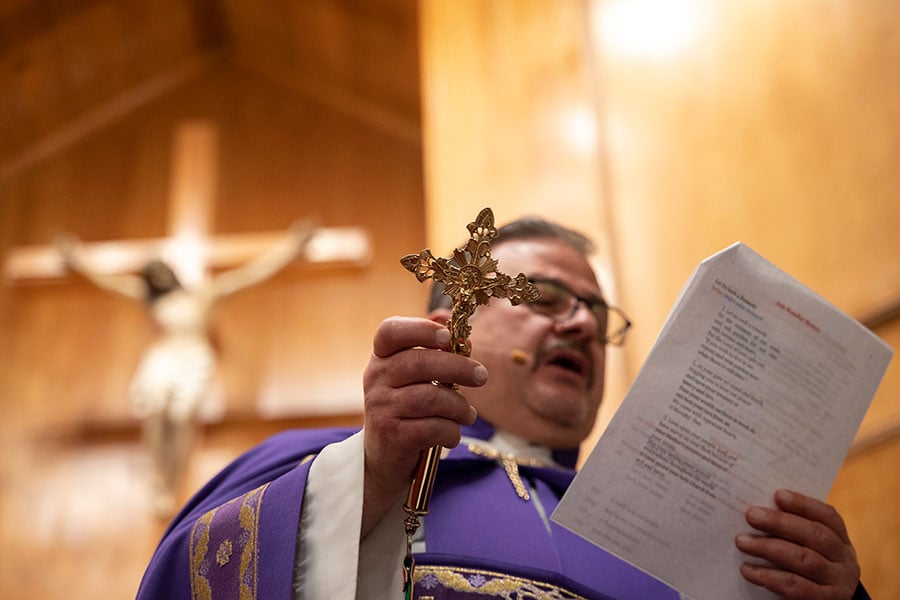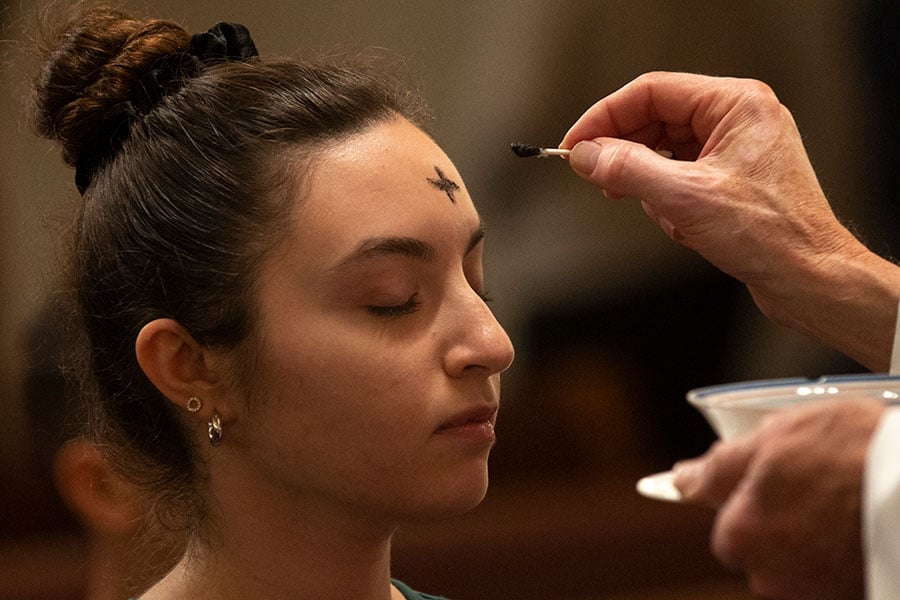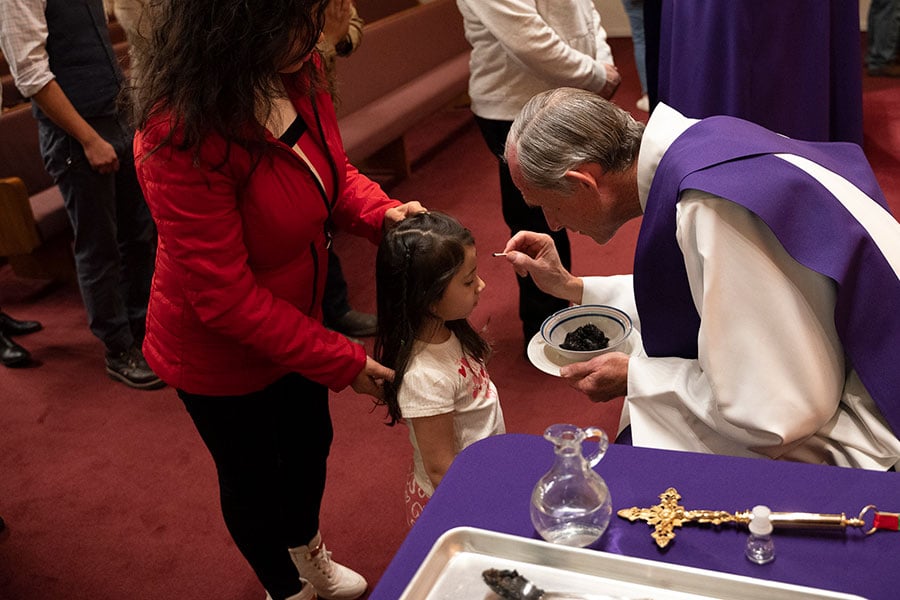Tradition with a twist: the observance of Lent in the Maronite Catholic Church

Fr. Assaad ElBasha conducts a blessing as he prepares ash for distribution during an Ash Monday Mass at Our Lady of Lebanon Maronite Catholic Church in Lewisville, on Monday, Feb. 12, 2024. (NTC/Ben Torres)
When Father Peter Raad recalls growing up in Beirut, Lebanon, his favorite memories center around faith, family, and the liturgies that prepared him for Easter.
“There were a lot of beautiful processions,” explained the priest who was ordained for the Maronite Catholic Church last May at Our Lady of Lebanon Church in Lewisville. “On Hosanna [Palm] Sunday, we dressed in white — our Sunday best — and every child carried a big candle decorated with ribbons. We would walk with the priests and deacons along the streets and the bells would ring.”
The blessed palms people received were often weaved into wreaths to hang on the front door.
“It marked the start of what we call Great Week [Holy Week] because it’s the greatest week that ever happened,” he added.
The Maronite Church Fr. Raad serves is an Eastern Catholic Church in full communion with the Roman Catholic Church. It takes its name from St. Maron, a Syrian hermit who lived in the fourth century. Certain prayers in the Maronite liturgy are said in Aramaic, the language spoken by Jesus Christ.
Maronites affirm the teachings of Roman Catholicism and recognize the Pope as head of the Church but have their own liturgy, spiritual heritage, and ecclesiastical structure.
Some Lenten practices highlight those differences. For Maronites, the “Entrance into Great Lent” starts on Cana Sunday with the Gospel reading of Jesus turning water into wine at the Wedding Feast at Cana (John 2:1–11). The biblical story is a reminder that Lent is a time for transformation and change through prayer, penance, and abstinence.
“In our Maronite spirituality, there is not a disconnect between the Incarnation, Crucifixion, and the Resurrection,” Fr. Raad explained. “It’s Mary who brought Jesus into the world and she takes Him to the wedding to introduce Him to the world again.”

Mary witnesses her son’s first miracle — an event that also foreshadows His passion and death.
“Wine is red like blood,” said the associate pastor at Our Lady of Lebanon. “Right there Jesus predicts His bleeding on the cross and His crucifixion. He shows us what’s ordinary in life will become extraordinary.”
The blessing and distribution of ashes is a Latin or western rite adopted by the Maronites.
“But we observe Ash Monday [following Cana Sunday] instead of Ash Wednesday because there are two feast days we celebrate during Lent — St. Joseph on March 19 and the Annunciation on March 25. On those days we don’t fast,” Raad continued.
Maronites fast and abstain from meat on Ash Monday and Good Friday, and they abstain from meat on all Fridays. Many Maronites will not eat food or drink from midnight until noon except for water and medicine each day during Lent. Until the 1920s when the practice was largely discontinued, they also abstained from oil, wine, eggs, milk, and cheese.
Too many people look at abstaining and fasting during Lent from a “Woe is me, I’m a sinner” mindset, said the priest, a long-time engineering professor at Southern Methodist University. He encourages parishioners to look at Lent as an opportunity for change.
“We’re walking with Jesus, and we want to focus less and less on earthly things and more and more on the spiritual,” he advised. “As St. Paul would say, we’re moving our gaze from downward to upward — from an earthly to a heavenly perspective.”
In the Maronite lectionary, the Sunday Gospel passages throughout Lent focus on the healing and forgiving powers of Jesus — a reminder that Lent is a time to transform one’s life, just as the water was changed to wine at the Wedding Feast at Cana.
“Increase your prayer life and spirituality by reading the Gospels and other books,” Fr. Raad recommended. “Increase your attention to the amazing work of the Lord God coming into our life and dying for us.”

Maronites observe Passion Week with intense experiences of sublime music and ritual. On Good Friday, two ceremonies are customary. The first is the “Signing of the Chalice,” also called the “Liturgy of the Pre-Sanctified.” It is a celebration of the Divine Liturgy with no Words of Institution because on Good Friday, the only sacrifice is the sacrifice of Christ.
During the ceremony, the priest invokes the Holy Spirit to descend upon the chalice placed at the altar and make it the Blood of Christ to be given during the communion with hosts consecrated the night before on Holy Thursday.
It is followed by a second, dramatic ritual.
“There is a beautiful service of the burial of our Lord where they take a model of the crucified Jesus down off the cross and place Him on a shroud — a large blanket,” Fr. Raad said.
Four men lift the shrouded figure and begin a procession so people can walk under it as a sign of blessing. They also bring red roses to throw on top of the body.
“At the close of the ceremony, the priest lays the figure of Jesus in the replica of a tomb and uses a cardboard cover, resembling stone, to close it,” he added.
On Easter Sunday the flowers left on the body are taken back to recognize the new life won by Christ’s Resurrection.
Fr. Raad likes to use the Lenten season to remind people God is loving and merciful.
“People sometimes think they’ll never be forgiven,” he said. “But God did not die to convict us. He died to save us and rose to take us home. Ask for His forgiveness. We’re never too sinful and it’s never too late.”
